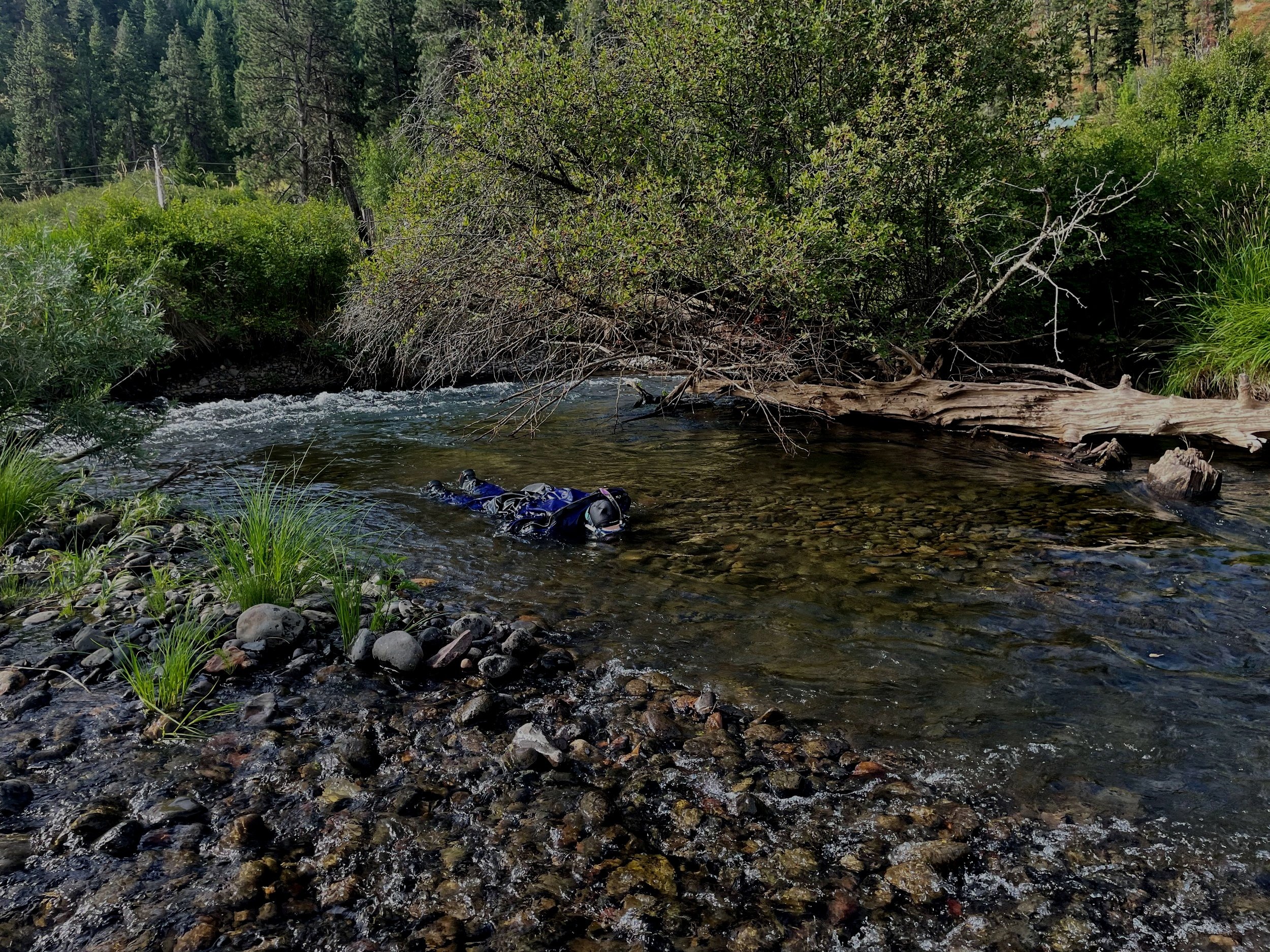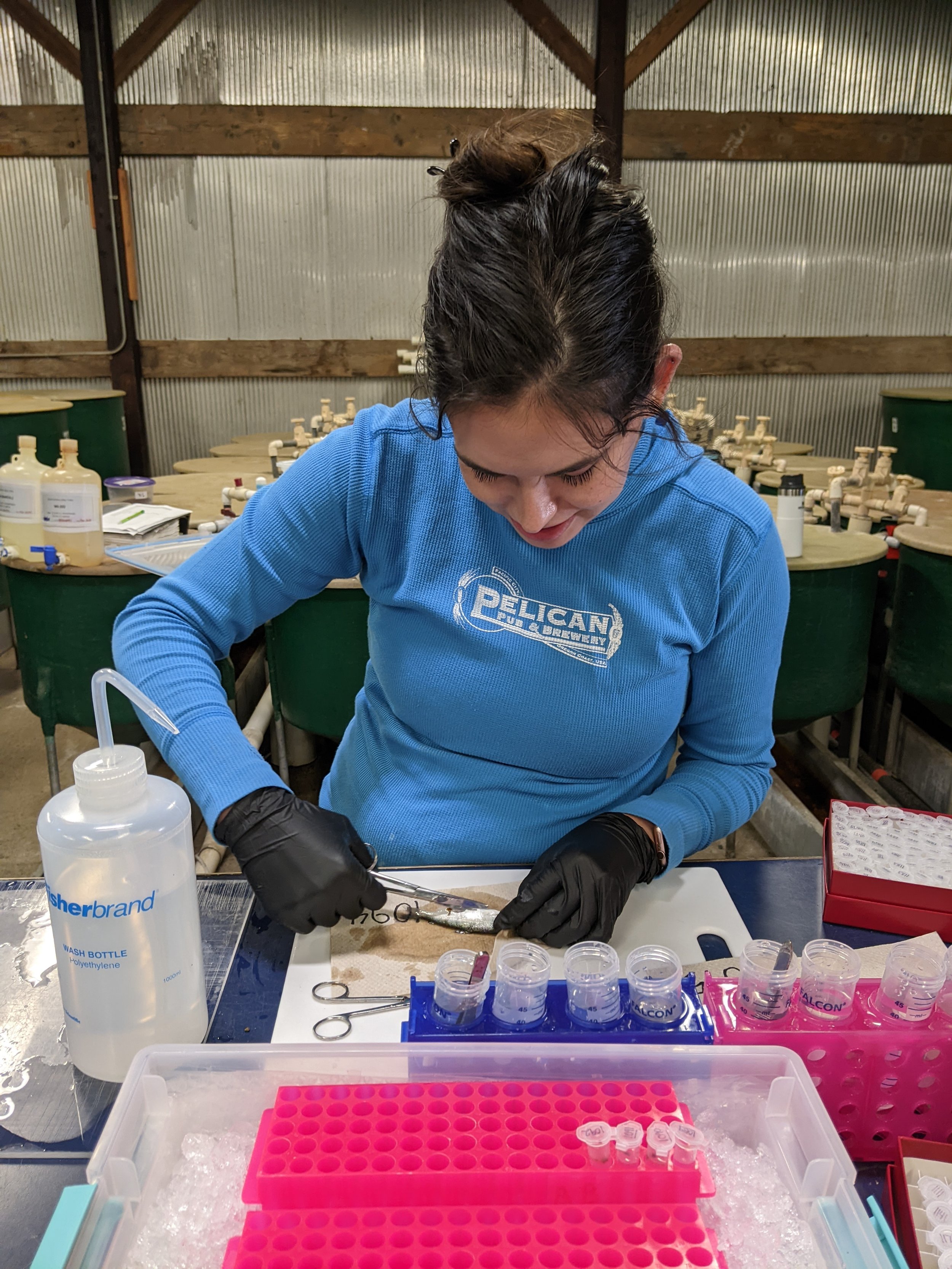
Meet the FBL
-

Seth White
Principal Investigator
Dr. Seth White is an Associate Professor in the Department of Fisheries, Wildlife, and Conservation Sciences, Oregon State University. He is a fisheries scientist specializing in river ecosystems and Pacific Salmon, and currently serves as an invited member of the International Union for Conservation of Nature (IUCN). He was previously a Senior Fisheries Scientist at Columbia River Inter-Tribal Fish Commission for 13 years where he established and continues to foster relationships with tribes. He has been a Conservation Science Fellow at the Wilburforce Foundation and COMPASS, a Fulbright Fellow to Czech Republic, and a founding member of the Grande Ronde Atlas Science Advisory Committee that developed a habitat restoration prioritization method that has been widely adopted in the Columbia River basin. He is an enthusiastic angler and supports sustainable recreational, commercial, and tribal fisheries
-

Crystal Herron
PhD Student
crystal.herron@oregonstate.edu
Crystal is a first year PhD student co-advised by Drs. Seth White and James Peterson. Her research interests are in fish physiology with focus areas in stress, pathophysiology, metabolism, and epigenetics. Her interest in Fisheries Science began while volunteering at the Oregon Coast Aquarium as a teenager where she observed that fish have dynamic lives full of environmental and social interactions, stress responses, puzzle solving, and decision-making skills. She earned her Master’s in 2016, where she studied the physiologic impacts of parasitic Salmincola californiensis infection in juvenile Chinook salmon under Dr. Carl Schreck at Oregon State University. Ultimately, her career goal is to provide evidence indicating that fish are worth dignity and respect- how those attributes are expressed should be done so from the animal’s perspective, not anthropocentrically. When not working, she adventures around the state with her family and mentors youth in the Corvallis area. Her ideal meetings are held walking through trees with hot coffee in hand, rain or shine.
-

Emily Treadway
Masters Student
emily.treadway@oregonstate.edu
Emily graduated from Appalachian State University in 2021 with a bachelor’s in biology. She spent her early career in outdoor education and outreach and later moved into biological research with a focus on salmonids. Emily is also an avid outdoorswoman with backpacking and rock climbing at the top of the list.
Emily currently works for Oregon Department of Fish and Wildlife in the East Region Fish Research office. Her research is investigating straying of adult hatchery spring Chinook in the Wenaha River in Northeastern Oregon. It will encompass the temporal and spatial distribution of both hatchery and natural fish through intensive spawning grounds surveys and inform future management practices on how best to mitigate hatchery fish impacts on natural spring Chinook populations.
-

Kayla Kelley
Masters Student
Kayla’s research is focused on investigating juvenile Chinook salmon dispersal patterns based on spawner origin and riverscape conditions, and juvenile abundance at habitat restoration sites in northeast Oregon. She is also interested in differences in distribution and dispersal patterns between wild and hatchery origin fish. Her project aims to better understand the spatial ecology of both adult and juvenile life stages, and the population-level benefit of restoration actions for Chinook salmon in Catherine Creek.
Kayla graduated from the University of Central Florida in 2018 with a bachelor’s in biology and a minor in environmental sciences. Prior to starting at Oregon State University, Kayla focused on native lamprey conservation in the Pacific Northwest, focusing on occupancy at restoration and superfund sites. She has also worked on management efforts for razorback sucker and Colorado pikeminnow in the Southwest, with a primary focus on fish passage research and predator-prey interactions. Kayla enjoys hiking and camping with her husband and four dogs!
-

Zach Sherker
Post-doc Scholar
zachary.sherker@oregonstate.edu
Zachary’s post-doc research uses radiotelemetry to track and compare the migration timing and spawning locations of hatchery-reared and wild-origin spring Chinook salmon in the North Umpqua River, Oregon. This study aims to provide information on how hatchery and wild Chinook salmon interact on spawning grounds to determine the impact that stray hatchery-origin salmon have on wild salmon populations. Zachary is also working with local watershed associations, ODFW, and indigenous research groups to monitor juvenile salmon migrations through tide gate structures using passive integrated transponder (PIT) tags.
Zachary was a recipient of the Al Martin Fellowship for Conservation Sciences during his PhD dissertation at the University of British Columbia, which focused on effectiveness monitoring for salmon passage remediation projects for culvert and floodgate barriers in BC. During his PhD, Zachary designed novel noise-cancelling PIT antennae to track and compare juvenile salmon movement through floodgate barriers on the Lower Fraser River during overwintering. Zachary is a nature lover and plays the drums loudly when not in nature.
-

Ashley Sanders
Faculty Research Assistant
ashley.sanders@oregonstate.edu
Ashley’s role in the lab is to organize project logistics, assist with study design and implementation, and is here for general problem-solving capacity. She also manages operations for the Oregon Hatchery Research Center. She completed a master’s degree in the College of Forestry working with cutthroat trout populations in the headwaters of the Oregon Coast Range and before that, worked for the National Council for Air and Stream Improvement (NCASI) initiating a large-scale riparian buffer project. In her spare time she enjoys learning about history, botanizing, and convincing people that Corvallis is the best place in the world.
-

Mimi Obley
PhD Student
Mimi’s research is part of the Olfactory Imprinting Project and focuses on hatchery-reared salmon and their navigation back to their natal streams. Our current project focuses on testing different olfactants by adding them to the hatchery environment and analyzing the effects on homing behavior. She is also interested in other factors that influence straying such as hatchery location, geography, and climate change.
Mimi graduated from Asbury University in 2020 with a bachelor’s in biology. In 2021, she started a master’s degree at Oregon State University in the Integrative Biology department studying domestication selection in hatchery-reared steelhead. She is interested in fish behavior and the intersection between conservation of salmon populations and the utilization of those populations as resources. Mimi enjoys working with different art mediums and hiking with her dog!
-

Kasey Ingram
Undergraduate Student
Kasey is a College of Science student earning a degree in Biology with a concentration in Marine Biology and Ecology. They have primarily worked in the Fish Behaviorscapes Lab throughout the summer of 2024 and have presented a conference poster titled “Assessing eDNA as a Non-invasive Sampling Technique for Pathogen Detection in Salmonid Fish.” Throughout the school year Kasey is working with Mimi and Ashley to continue their eDNA related research in hopes of learning more about effective pathogen detection in fish. Outside of work, Kasey likes to spend time drawing and weight lifting.
-

Will Sisley
Undergraduate Student
Will is earning his degree in Natural Resources in the College of Forestry. He worked on the Catherine Creek Project field crew and assisted partner agencies with various fisheries surveys in the summer of 2024. His favorite part of the field season was snorkeling and seeing fish in their natural environment. During the school year, he has been working with Kayla to develop a research project using a subset of the data he collected. In his free time, you can find him climbing a rock or exploring the great outdoors!